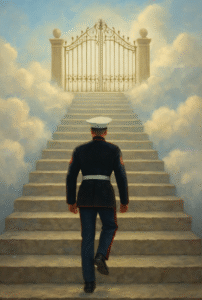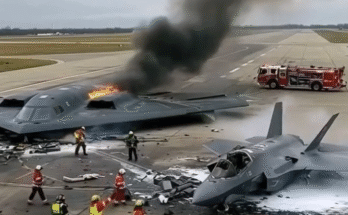Gate Guard Duty at the Pearly Gates
The first thing I remember after dying was not some grand trumpet or a glowing choir, but the quiet. The world went dim, then silent, and when I opened my eyes, I was standing on a staircase—marble steps stretching upward into an endless sky. Six hundred of them, by the count of the small brass plaque hammered into the first riser:
“Welcome. 600 steps to the Pearly Gates. No shortcuts.”
Of course, I grumbled. After all, I’d just spent a lifetime trudging up the metaphorical steps of bills, obligations, and responsibilities. And now eternity required cardio? Still, something in me knew there was no arguing. So I climbed.
Step after step, I thought about what I’d see when I reached the top. Would Saint Peter really be there with his ledger? Would angels hand me a harp, or perhaps my grandmother would wave me over for coffee and pie?
By step 400, my thighs burned. By 550, I was sure the stairway itself was the last great test. But then, finally, I crested the 600th step and there they were: the famous Pearly Gates.
They glowed faintly, not with garish neon light, but with a steady, calm brilliance, like polished seashells catching the dawn.
And standing in front of them, as if he’d been waiting all eternity for me personally, was a Marine.
Not an angel. Not Saint Peter. A Marine.
He wore the dress blues, pressed to perfection, the white cover perched squarely on his head, and the unmistakable bearing of someone who had stood too many watches to count. His face was carved into seriousness, but there was the faintest curl of humor at the corner of his mouth, as though he knew a joke I wasn’t in on yet.
“Welcome,” he said, in a voice that was both firm and oddly familiar. “Congratulations on making it up all six hundred steps.”
“Thank you,” I managed between gasps. “So… is this it? Do I check in? Do I meet God?”
The Marine shook his head. “Not quite yet. First things first—your duty assignment.”
I blinked. “Duty assignment? I thought the point of heaven was rest. Eternal reward. No more work.”
“Not exactly,” he said, handing me a clipboard that had materialized from nowhere. “Everyone pulls gate guard duty at some point. It’s how we keep things running smoothly. Today, it’s your turn.”
I laughed nervously. “That’s funny. Seriously though, when do I get to see my family?”
He didn’t flinch. He didn’t blink. The smile curled just a fraction deeper.
“Son,” he said, “you’re on the watch now.”
The First Watch
They gave me a set of crisp whites—not the flowing robe I’d expected, but a uniform. Sturdy boots, a neat tunic, and a cap that wouldn’t stay straight on my head no matter how much I fiddled with it. My post was simple: stand beside the Marine at the gates, greet arrivals, and keep my eyes open.
That first hour was awkward. I didn’t know what to say to the newly arrived souls. Most looked bewildered, some wept, a few laughed with relief. The Marine had a rhythm down: firm nod, welcoming smile, clear directions to the gates once paperwork was in order. I stumbled through my lines, fumbling the clipboard and mumbling reassurances.
Finally, when a lull came, I turned to him. “Why me? Why anyone? Surely heaven doesn’t need guards. What’s there to guard against?”
The Marine’s gaze stayed steady on the horizon. “It’s not about defense. It’s about honor. Every soul who comes up these steps deserves a proper welcome, someone to bear witness to their journey. And who better to do that than those who know what it means to stand a post?”
His words hung in the air like a sermon. I began to understand.
The Lessons of the Gate
As the hours passed, I noticed patterns. Some people sprinted up the steps, breathless but eager. Others crawled, each step a burden of regret or doubt. Some laughed all the way, others wept until the end.
Every arrival was different, but all were met the same way: a Marine standing watch, steady and unyielding, a silent symbol that the passage into eternity was not chaotic or random. It was guarded, honored, respected.
I began to feel pride in my post. The nervousness faded. I learned how to read people, how to offer just enough comfort without taking away their moment of awe. Sometimes all it took was a nod. Sometimes a simple “Welcome home.”
During a quiet stretch, I asked the Marine how long my shift would last.
He chuckled. “Time doesn’t work the way you think it does here. Sometimes a watch is an hour. Sometimes it’s a century. Doesn’t matter. What matters is being present.”
Conversations at the Gate
One man arrived angry, shouting that he wasn’t ready to die, demanding to be sent back. I froze, unsure what to do. The Marine stepped forward, his voice calm but commanding. “Your orders have been cut. Your watch down there is done. You’re needed here now.” The man’s anger softened, his shoulders slumped, and he walked through.
Another woman collapsed at the top step, sobbing that she was unworthy. I knelt beside her, helped her to her feet, and told her what the Marine had told me earlier: “Everyone deserves a proper welcome. That includes you.” She looked at me as if I’d handed her a crown, then passed through the gates with trembling joy.
It struck me then that gate guard duty was not a punishment. It was a privilege—to witness the raw humanity of souls on the threshold of forever.
The Marine’s Story
Between arrivals, I grew curious about my stoic companion. “So,” I asked one day, “how long have you been on this post?”
He smiled faintly. “Since Belleau Wood.”
I blinked. “That was… World War I.”
“Correct,” he said. “We’ve always been here. First to fight, first to guard. Marines don’t leave their post, even after death.”
There was pride in his voice, but no arrogance. Just a steady truth. And in that moment, I realized the deeper meaning: the gates of heaven, like the gates of any fortress or home, were guarded by those who knew sacrifice, who understood duty, who had lived—and died—by the creed of service.
My Relief
Eventually, another figure appeared at the top of the steps: not a soul arriving, but someone coming to relieve me. He wore the same uniform, his eyes kind but resolute. “You’re off post,” he said. “Go on in. We’ll take it from here.”
I glanced at the Marine beside me, unsure. He nodded. “Good watch. You did well.”
Something in me swelled at the praise. I had stood the post, however briefly, and it mattered.
With a final look at the gates, at the souls still climbing, I stepped through.
Epilogue: The Meaning of Guard Duty
Now, on the other side, I think back on those hours—days?—at the gate. I realize that the climb of 600 steps wasn’t meant to exhaust me but to prepare me. To strip away the last of my ego, my expectations, my assumptions about reward.
The real reward wasn’t streets of gold or angelic choirs. It was the chance to stand a post in heaven, to honor others as they arrived, to learn that eternity is not passive but purposeful.
And somewhere, right now, another bewildered soul is climbing the steps. Another Marine waits at the top, ready to hand them the clipboard, ready to say the words I’ll never forget:
“Welcome. It’s your turn for gate guard duty.”


